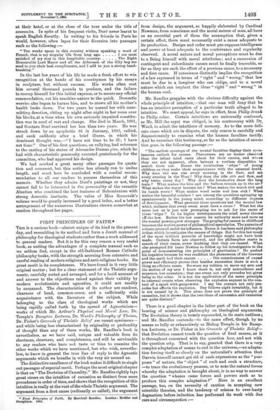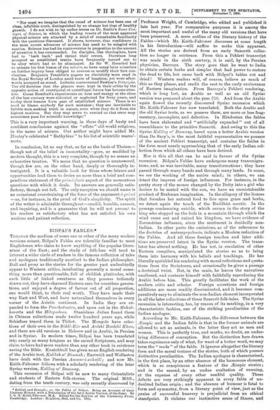FIRST PRINCIPLES OF FAITH.*
Tam is a curious book—almbst unique of its kind in the present Asp, and resembling in its method and form a Jesuit manual of philosophy for theological students rather than a work addressed to general readers. But it is for this very reason a very useful book, as uniting the advantages of a complete manual such as we seldom find, except, in the old-fashioned Roman Catholic philosophy books, with the strength accruing from extensive and careful reading of modern religious and anti-religious books. Its great merit is its completeness. We have found in it very little original matter ; but for a clear statement of the Theistic argu- ments, carefully sorted and arranged, and for a lucid account of and answer to the objections raised against their validity by modern evolutionists and agnostics, it could not readily be surpassed. The characteristics of its author are candour, clearness of head, common-sense, and a sufficiently wide acquaintance with the literature of the subject. While belonging to the class of theological works which are being rapidly called forth by the spread of Agnosticism— works of which Mr. Arthur's Physical and Moral Law, Dr. Temple's Bamptou Lectures, Dr. Ward's Philosophy of Theism, Dr. Fisher's Grounds of Theistic Belief are recent specimens— and while being less characterised by originality or profundity of thought than any of these works, Mr. Randles's book is nevertheless, as we have said, unique and valuable from its shortness, clearness, and completeness, and will be serviceable to any readers who have not taste or time to examine the other works which we have mentioned, but who wish, neverthe- less, to know in general the true line of reply to the Agnostic arguments which we breathe in with the very air around us.
The distinctive excellence of the book makes it difficult to single out passages of especial merit. Perhaps the most original chapter is that on " The Doctrine of Causality." Mr. Randles rightly lays great stress on the intuition of causation as distinct from mere precedence in order of time, and shows that the recognition of this intuition is really at the root of the whole Theistic argument. The argument from a first cause (ordinarily so called), the argument
First Principles of Faith. By Harebell Handles. London: Hodder and Stoughton. 1884. from design, the argument, so happily elaborated by Cardinal Newman, from conscience and the moral nature of man, all have as an essential part of them the assumption that, given a certain effect, there must necessarily exist a cause adequate to its production. Design and order must pre-suppose intelligence and power at least adequate to the contrivance and regularity observed. A moral nature and moral perceptions must be due to a Being himself with moral attributes ; and a succession of contingent and subordinate causes must be finally traceable, so far as they are each the effect of a previous cause, to a necessary and first cause. If conscience distinctly implies the recognition of a law expressed in terms of " right " and " wrong," that law must be due to a lawgiver who can oblige, and to a moral nature which can implant the ideas " right " and " wrong" in the human soul.
Mr. Randles grapples with the obvious difficulty against the whole principle of intuition,—that one man will deny that he has an intuitive perception of a particular truth alleged to be intuitive. We must appeal, he says in effect, from Philip drunk to Philip sober. Certain intuitions are universally confessed, as Mr. Mill (he says) was obliged, in his controversy with Dr, Ward, to admit the intuitions of memory. As to the more deli- cate cases which are in dispute, the only course is carefully and dispassionately to examine what the human faculties testify. And he examines this testimony, so far as the intuition of cause, tion goes, in the following passage :—
"The earliest openings of the mental faculties display their spon- taneous outlook for causes. Phenomena are no sooner observed than the infant mind casts about for their causes, and where they are not apparent, often betrays a restless disposition to search them out. Hence the numberless ' whys ' of young children as they make their acquaintance with the external world. Why does the sun rise every morning in the East, and set every evening in the West ? Why does the tide ebb and flow, and why twice every day ? Why does the locomotive draw the long train ? What makes the kite and the balloon remain up in the air P What makes the water become ice ? What makes the watch tick and its hands move ? What makes wood swim and iron sink ? What makes the beautiful rainbow ? are among the questions springing up spontaneously in the young mind, according to different degrees of development. What prompts these questions but the mental law which declares that every event mast have a cause ? What but the same law as is just now prompting me to ask for the cause of these whys '? In its higher developments the mind never throws off the law. Bather the law asserts its authority more and more as the mental powers grow stronger. The groping for causes in child hood becomes the motive-power of philosophical speculation. The pursuits of science proceed under its influence. Hence it has been said philosophy is that which investigates the causes of things. But for this law many of the most brilliant pursuits of knowledge might not have been made. Certain facts are observed, and the philosopher starts in search of their cause, never doubting that they are caused. What else prompted Sir Isaac Newton to follow up his investigation to the point of demonstrating the principles of gravitation ? He pushed his inquiries because he was confident the phenomena of the heavens and the earth had their causes Onr consciousness of causal power and efficiency proves that besides succession there is such a thing as efficient cause. Between my volition to move my arm and the motion of my arm I know there is, not only antecedence and sequence, but causation ; that one event not only precedes but gives being to the other. It is bat the application of the same principle to external events when observing the explosion aequent to the con- tact of a spark with gunpowder. I say the contact not only pre- cedes but effects the explosion. Day follows night invariably, but it is not caused by it. This alone does not prove the principle of causation, but it shows that the two ideas of succession and causation are quite distinct."
There is a good chapter in the latter part of the book on the bearing of science and philosophy on theological arguments. The Evolution theory is tersely expounded, in its main outlines ; and Mr. Randles contends—to the same effect, though by no means so fully or exhaustively as Bishop Temple in his Bamp. ton Lectures, or Dr. Fisher in his Grounds of Theistic Belief— that Evolution cannot touch the question of final causes, as it is throughout concerned with the question how, and not with the question why. That is to say, granted that there is a very complex adaptation of means to end in the universe,—an adapta- tion forcing itself so closely on the naturalist's attention that Darwin himself cannot get rid of such expressions as the " pur- poses " of nature, the " object " of such and such a structure, —to trace the evolutionary process, or to note the natural forces whereby the adaptation is brought about, is in no way to answer the question " whence came forces and powers such as to produce this complex adaptation ?" Here is an excellent passage, too, on the necessity of caution in accepting new scientific theories, and the tendency of science to over-hasty dogmatism before induction has performed its work with due care and circumspection :— " Nor must we imagine that the creed of science has been one of clear, infallible truth, distinguished by no change but that of healthy growth. I do not wish to lay undue stress on Dr. Stallo's Some Con- cepts of Science, in which the leading tenets of the most approved physical science are attacked by a mind of remarkable familiarity with the questions discussed. It shows, however, that confidence in the most recent advances of science has need to be mingled with caution. Science has had its controversies in proportion to the amount of attention it has commanded. Its disciples, like theologians, have had to ' bark back' and recant their errors. Doctrines long accepted as established truths have frequently turned out to be alloy which had to be eliminated. As Sir W. Herschel had to unlearn his first lesson of the nebuloi, so have many later scientists on further inquiry been obliged to reverse or modify their first con- clusions. Benjamin Franklin's papers on electricity were read in the Royal Society of London amid roars of laughter, yet were after- wards accepted as sound. Leibnitz controverted Newton's Principia. The old doctrine that the planets were kept in their orbits by the opposite action of centripetal or centrifugal forces has become obso- lete. Count Rumford's experiments on heat and energy at the close of the last century were ridiculed or neglected for forty years, and to-day their lessons form part of established science. There is no need to blame anybody for such mistakes ; they are inevitable to fallible men seeking truth in nature, even when they do it from the highest motives. But they may serve to remind us that error may sometimes pass for scientific knowledge."
This is a very important warning, in these days of hasty and confident conclusions against the " effete " old-world religions, in the name of science. Our author might have added Mr. Huxley's celebrated " Bathybius " to his list of scientific mares'- nests.
In conclusion, let us say that, so far as the basis of Theism— though not of the belief in immortality—goes, as modified by modern thought, this is a very complete, though by no means an exhaustive treatise. We mean that no question is unanswered, though few are, on the other hand, deeply or thoroughly in- vestigated. It is a valuable book for those whose leisure and opportunities lead them to desire no more than a brief and com- pendious statement of the prima facieaspect of the momentous questions with which it deals. Its answers are generally satis- factory, though not full. The only exception we should name is an occasional overstraining of the force of the argument aprieri —as, for instance, in the proof of God's simplicity. The spirit of the writer is admirable throughout—candid, humble, earnest, and inquiring, and is a guarantee that he will not present to his readers as satisfactory what has not satisfied his own anxious and patient reflection.















































 Previous page
Previous page